- Home
- Anthony Bourdain
Anthony Bourdain: The Last Interview Page 4
Anthony Bourdain: The Last Interview Read online
Page 4
BOURDAIN: A thousand pounds of fish this guy cleans in four hours, every day—
DUPLIEX: Yes! It’s a beautiful story.
BOURDAIN:—off the bone, and into perfect, three-star Michelin portions. It takes three trained sous chefs all day long, seven hours—three of ‘em working together—to replace this guy when he goes on vacation. But this is a perfect example! I would have never been able to write that, I never would have had access to this guy, I never would have known about him if I hadn’t been best friends with Eric Ripert,*5 and been in this weird, compromised—the very thing that allowed me to write that was the fact that I should never be trusted to be a critic of a restaurant…I live in a half world, you know?
DUPLIEX: Yeah, yeah, between heaven and hell there’s a chaos…
BOURDAIN: Life is good. I like my job.
DUPLIEX: I like the Urban Dictionary because they went on to say “on his TV shows, he’s known for eating way too much yet being tall and skinny, smoking excessively,” so this was written a few years ago, “and getting drunk most everywhere he goes. [Bourdain laughs] He can also be extremely obnoxious and arrogant when doing any of these three things.” But you’re not, are you?
BOURDAIN: I can be, I—
DUPLIEX: He’s been so well mannered, we’re all so disappointed.
[Audience laughter]
BOURDAIN: Umm, I can be, I can be really obnoxious—
DUPLIEX: But you’re not exactly biting the heads off chooks*6 or screwing the waitress over the hot grill.
BOURDAIN: You know, that’s so last week? [Bourdain laughs] I mean, I’m older now, you know? First of all, I’m the father of a little girl. That means a lot to me. I’m not gonna apologize for my previous life—that’s what daddy was, that’s what daddy did—but I don’t want her reading terrible shit about me on the internet, behaving badly towards women, for instance. I’m not gonna do that.
You know, I was referred to, when Kitchen Confidential came out, as a “bad boy chef.” Now, I was forty-four years old when that book came out, so already it was ludicrous. I never really took it that seriously. And I’m certainly not that bad, I’m certainly not a boy, and I’m not even a chef anymore! But one of the reasons I wrote this book was to kind of correct that impression. But I think I’ve benefited very much from the fact that Kitchen Confidential was so over-testosterone and so obnoxious. I didn’t think anyone would read it outside of the restaurant business so it was written for the consumption and entertainment of my fry cook, essentially—that was the only person I could ever imagine buying a copy. So it was intended to be entertaining and amusing to a very tiny group of people who were working in New York restaurants, and the tone reflected that. It would sound softer and more familiar to them.
But I benefited from—because the book was so obnoxious, people are surprised when I can eat with a knife and fork and not bark obscenities indiscriminately at least. You know I benefit very much from low expectations.
[Audience laughter]
DUPLIEX: The voice in all the books is very strong. Were you born with that voice? Is that your natural voice? Do you write as you speak, speak as you write or did you have early influences, did you have something to model yourself on?
BOURDAIN: I’m gonna tell you something that aspiring writers or writers here will really hate me for: I’ve never written anything in my life that hasn’t been published.
DUPLIEX: Yeah, we hate you.
BOURDAIN: I have never toiled away in a garret for years writing unsuccessful or unpublished manuscripts. I wrote the article that Kitchen Confidential was based on for a free paper in New York. I figured they were lame enough to buy my piece. It ended up in the New Yorker. I got lucky. I’m always talking, telling stories. Being a little provocateur with a way with words was something that was true of me when I was a little kid. I’ve always used that skill to get the things I want, to manipulate events to my liking, to get myself into trouble, to get myself out of trouble, to hurt my enemies, to seduce people, or make people do things I would like them to do. So I was always a little…you know, my parents very early on said “You should really be a lawyer, you’ve got such a way with words.”
I write like I talk. But yeah I pretty much…Yeah, I’ve always been like this.
DUPLIEX: Right.
BOURDAIN: If there were influences, writing influences, who really turned on the light for me—I always did read a lot—certainly you can hear Hunter Thompson in my writing. When I was twelve years old I opened Rolling Stone magazine where they were serializing what then became Fear and Loathing in Las Vegas, and that clicked for me. His rage, that someone could write, could put into words the way I felt—this bitter disappointment with the way the sixties turned out. The hyperbole, the lush, violent language, the humor—clearly that was an influence. But he was maybe not the best role model for a twelve year old. [Audience laughter] I sought to emulate him in all ways but actually writing, you know. I just figured maybe if I take a lot of drugs for the next thirty years, I’ll be able to write like that! [Bourdain laughs]
But he was also a cautionary tale because I think I learned that—by the time the book hit—I realized I don’t want to end up like Hunter Thompson either. I’m not gonna go out there and play the bad boy chef, you know, and get paid for it. I’m just, you know…You’ll notice the most perverse thing I’ve been able to do the last few years, I’m very proud of is, I’ve done a couple of really fuzzy, warm, family-friendly shows. I say that’ll really stick it to my fans. They’ll be so disappointed.
[Audience laughter]
DUPLIEX: Yep. You’ve also eaten some very strange things in your life and I don’t want to say “Okay, what’s the worst thing you’ve ever eaten?” So, instead, I’m going to give you a list of some of the nastiest things—
BOURDAIN: Quick fire? Love that.
DUPLIEX:—in the world, okay, and you just tell me if you’ve had them and if it’s relevant, what they tasted like. Because you might have swallowed some, you might have spit, I don’t know. Okay! Sheep testicles.
BOURDAIN: Had ‘em, delicious, good texture, much better than beef nuts.
[Audience laughter]
DUPLIEX: Good to know. Seal eyeballs.
BOURDAIN: Good when fresh, like good quality sushi. In context, it could be a heartwarming family experience.
[Audience laughter]
DUPLIEX: The beating heart of a giant cobra.
BOURDAIN: I’ve said it’s like an angry, over-athletic oyster. Is it food, or is it some sort of weird boner medicine for anxious Asians? I kind of regret it.
DUPLIEX: You regret that?
BOURDAIN: Not much going on there flavor wise. You know, what are your expectations? [laughing] It’s more like a weird male bonding, is-it-medicine or is-it-food kind of situation. I wouldn’t do it again. It wasn’t bad, it wasn’t an unpleasant experience, but you know…poor cobra.
DUPLIEX: Yeah, yep…Um, the unwashed rectum or anus of a warthog.
BOURDAIN: Okay. It tasted exactly like you would expect it to taste.
[Audience laughter]
DUPLIEX: Yeah, that’s what I was afraid of.
BOURDAIN: But this was a—I knew I was going to be ill, I did get very ill, I knew it was going to be terrible, but this was a tribal situation. I’m a good guest.
DUPLIEX: You are, you’re very well mannered.
BOURDAIN: I’m in a tribal situation, the whole tribe was looking at me, the chief is handing me the best, most treasured part, it’s taken him three days to track this thing—I’m taking one for the team.
DUPLIEX: [Laughing] Oh yeah.
BOURDAIN: I’m actually polite in such circumstances.
DUPLIEX: Yes.
BOURDAIN: You know, I do something called the “grandma rule”—if I’m at grandma’s house I will eat
what grandma offers and I will say yes grandma it’s delicious I’ll have seconds. I passed on the seconds this time [laughing] but I did my best to soldier through.
DUPLIEX: That was in…
BOURDAIN: Namimbia. In the Kalahari with the bushmen.
DUPLIEX: In Iceland there’s a thing called a stinking rotten fermented shark…
BOURDAIN: Rotten, rotten shark
DUPLIEX:…that you can smell from ten kilometers.
BOURDAIN: Yeah. It’s unspeakably vile. Gill and I were both—A. A. Gill and I were both asked the other day*7 what’s the worst the worst thing you’ve ever tasted. We both agreed. That is just far and away, it’s just, it’s that reek of ammonia and urine, it’s beyond—they handle it with gloves! I mean, they don’t even touch the stuff when they serve it to you!
DUPLIEX: But that’s mostly the smell surely?
BOURDAIN: No, it’s the flavor. Unlike durian*8, for instance, that smells like hell but to my mind tastes awesome, has something real going for it, something wonderful—this tastes just as bad as it smells. And I don’t think anyone actually likes it. It’s a nod to their proud, Viking roots and harder, more austere times when this was the only way they could preserve protein during the summer months. I mean, you see them handling it with gloves, they put it in their mouth, and they chase it with this big shot of, like, rocket fuel—you know, how good can it be?
DUPLIEX: Well you would, yeah…All right, well now I do have to ask you what’s the worst thing apart from all those? Because I have heard you give a different answer…
BOURDAIN: Well I mean, would I eat rotten shark before I ate a Chicken McNugget? Um…I’d feel better about myself eating the rotten shark.
DUPLIEX: Yes, you would.
BOURDAIN: You know, I feel compromised, a part of an evil empire, when I eat a McNugget. There’s something morally wrong about it. And it’s just—what is it? What part of the chicken does it come from?
[Audience laughter]
DUPLIEX: All those other things we talked about you knew exactly what they were and where, particularly where, they had come from. And so the thing that scares you the most is the…
BOURDAIN: I’m scared that my daughter, the thought of my daughter eating one and liking it just fills me with terror. It is—we should feed our enemies Chicken McNuggets.
[Audience laughter]
You know, Osama Bin Laden wouldn’t have lasted anywhere near this long if he just had, you know, a regular McNugget diet. You know, Tora Bora, he wouldn’t have been able to squeeze his fat ass into a cave. [Audience laughter] We would have seen him from space! [Bourdain laughs]
DUPLIEX: The drones would have seen him, yeah.
BOURDAIN: Yeah!
DUPLIEX: So you spend your life traveling around the world. Now, do you feel an urgency at the moment to get out to certain countries relatively quickly before their street food, their authentic regional food, all the things that you’re going for to try, while they’re still around and before they start turning into Chicken McNuggets?
BOURDAIN: I don’t know, I’m kind of optimistic about the future of the world. It’s one of those things I—you know, the Chinese are increasingly buying everything in America, and buying all of our real estate and certainly all of our debt, and a lot of people are frightened. Will they come over here, and you know, pretty soon, they’ll be all over the place! Well, we’ll be eating a lot better. A lot better. So I think the expanding Asian influence, this power shift away from the West to the East, is probably, to me, at least for food, arguably a good thing!
I mean Singapore may be Disneyland with the death penalty, as I think R. W. Apple*9 called it, but it is a foodie wonderland. And they figured out—they are the nanniest of nanny states and they’ve got all of the same concerns you have here, about hygiene and zoning, and what if oh-my-god it might hurt you, we better make it illegal. You know, like the cheese situation here which is so shameful, or the oyster situation here which is so shameful. But they figured it out. You know, the food court in Singapore, to me, is a shining beacon of how we could live in a perfect world. So, I’m encouraged!
The places that I feel like I’m rushing to before they change, I mean, I’m not sentimental about Communism, I’m no big fan of the regime in Cuba, but I sure as hell wanted to see it before it changed. And it was indeed, it is indeed, something extraordinary. But the food scene there, you know—not so great. People are really, really hungry. I’d like to get to Burma then Myanmar but that’s a situation where I’m waiting for the government to change. I’d like to get to Tehran as soon as possible, but again, not right now.
DUPLIEX: Yeah, exactly. So you’re a bit like a canary, really, that we can send out into the world—
BOURDAIN: [Laughs] Yeah, when I keel over you’ll all know: don’t go there!
DUPLIEX: Yeah, exactly. Don’t go there! But, okay, if you are that canary and you are one of the first to note, in our food world, various changes, or drops of temperature, or cultural sort of shifts—is there anything your nose is telling you at the moment?
BOURDAIN: Paris is fun again. You can eat really, really well in Paris. You know, fifteen years ago they were rude, particularly to Americans, and it would cost you forty euros for a bowl of soup at a really good restaurant. You know, just spectacularly expensive. Now you can eat a terrific, world-class, Michelin-quality meal for forty euros, thirty euros, fifty euros, and they’ll even be nice to you—in a casual setting.
DUPLIEX: Yeah, we love a global financial crisis, don’t we?
BOURDAIN: But it’s these young chefs, you know—the gastronomy movement is really exciting. David Chang is a big influence in Paris. You hear French Chefs saying “Oh yes, we’d like this man David Chang, from New York.” This was unthinkable fifteen years ago, that, you know, any French chef would even acknowledge that Spain existed much less New York! [audience laughter] So that’s an exciting place to eat. Certainly, I see Singapore as a hopeful, culinarily, as a hopeful example, as an alternative. That’s fast food, too. It’s also good food.
Um, places I’ve been excited about…Tukey is amazing. I’d like to see more good Turkish food. You know, a wider range of Turkish foods than the usual suspects. Um…Brazil…Columbia—just in general, go to Columbia. It’s awesome. I went to Medellin which, ten years ago, was the worst place on Earth. The murder capital of the world. And now it is really—I came out of Columbia really optimistic about the world. Wow, it’s possible to improve a really fucked-up place in a short period of time. You know, there’s no excuse for inner city Detroit, having been to Medellin.
DUPLIEX: I think the beautiful girl on Modern Family’s done an awful lot for Colombian tourism as well. [Bourdain laughs] But, tell me, I mean, they’re famous, they export all their coffee beans to here, amongst other places—did you get a decent coffee in Columbia?
BOURDAIN: Yeah, but it was the food and the people. I mean, these are inseparable. Listen, I love food, I’m guilty of being a food pornographer, I fetishize it—but it is only one part of a full life.
You know, recently I married into a large, Italian, Sardinian family, and seeing how they live, their relationship with alcohol, and with food, and ingredients, has really been an education, you know? Good food, at whatever income level, is a birthright to them. Gotta have it. Wine with every meal, must have. But you never see drunk-ass Italians staggering around vomiting in the streets. They do everything in proportion. They understand that it’s about good food and good liquor, but also hopefully you’re getting laid on a regular basis and you’re having good conversation and there’s music somewhere, and company, and you know…those are all part of a thing. A life.
DUPLIEX: The reason you like Paris at the moment is, as you said, that next generation of chefs. Are you picking up that this generational change is actually changing all the cities around the world and all the dif
ferent food cultures, restaurant cultures.
BOURDAIN: Well look how differently, you know, look how different the kinds of businesses that are popping up here now—you know, a lot of these people who are opening up small places, or pop ups or just little, you know, stripped-to-the-bone casual eateries, they’re cooking their hearts out with maybe one other cook or a dishwasher. Listen, in the end of course they’ll give in, they’ll open a 300-seat restaurant, and they will have a place in a casino, and they will have a cookbook and a boil-in-a-bag dinner line. You know, Robuchon, and all the great French—Roger Vergé*10—all of those people started out that way, too. But what we’re getting is a lot more of ‘em and, you know, it’s just good times. It’s part of cyclical wave, and we’re eating—it’s certainly new to us, in the English-speaking world. So, you know, to my way of thinking there’s never been a better time to cook in the English-speaking world and there’s certainly never been a better time to eat.
DUPLIEX: Adrian Gill was talking the other day about that most depressing term, “fine dining”—you know, the chef likes to serve this warm, etc.—and he said, in this voice of wonderment, “And we let them get away with it!” Which I thought was gorgeous. So—chef hat back on—what do you think of this current restaurant trend towards fusing art and landscape and technology on the plate?
BOURDAIN: It depends, I mean—ask yourself before you start dabbling with what somebody somewhere is calling molecular gastronomy: Am I a genius? Am I Ferran Adrià?*11 Am I anywhere near as talented and as visionary and as firmly rooted in a place with as much food culture as Catalonia…or am I just kinda jerking off here?
[Audience laughter]
You know, I love Jimi Hendrix. Can I, will I, ever play guitar as well as Jimi Hendrix? Because you better. If you’re gonna mess around with that stuff, my way of feeling is don’t try. Find your own style.
A lot of those styles are going to end up standard practice in the industry, you know—sous vide for sure, a few others. I think people misunderstand Adrià for sure. But you know, short answer, some of the very worst, most painful meals of my life have been with people, talented young chefs, who become over-impressed and over-enthusiastic about a cargo cult version of what they believe to be happening at places like El Bulli and they’re just playing out of their depth.

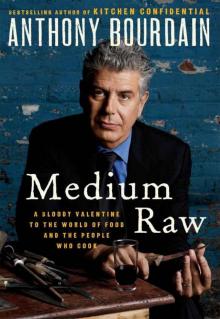 Medium Raw: A Bloody Valentine to the World of Food and the People Who Cook
Medium Raw: A Bloody Valentine to the World of Food and the People Who Cook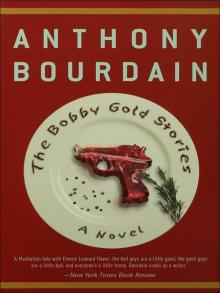 The Bobby Gold Stories
The Bobby Gold Stories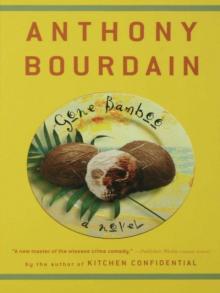 Gone Bamboo
Gone Bamboo Typhoid Mary
Typhoid Mary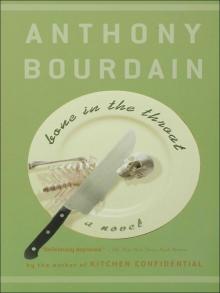 Bone in the Throat
Bone in the Throat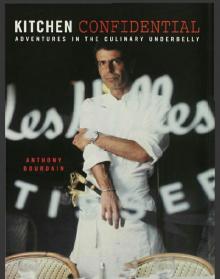 Kitchen Confidential
Kitchen Confidential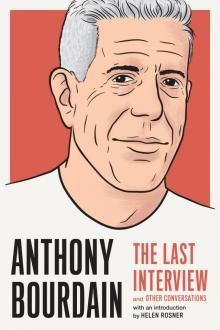 Anthony Bourdain: The Last Interview
Anthony Bourdain: The Last Interview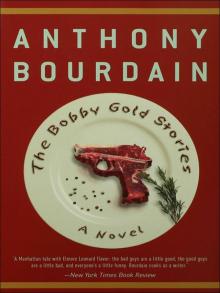 Bobby Gold Stories
Bobby Gold Stories